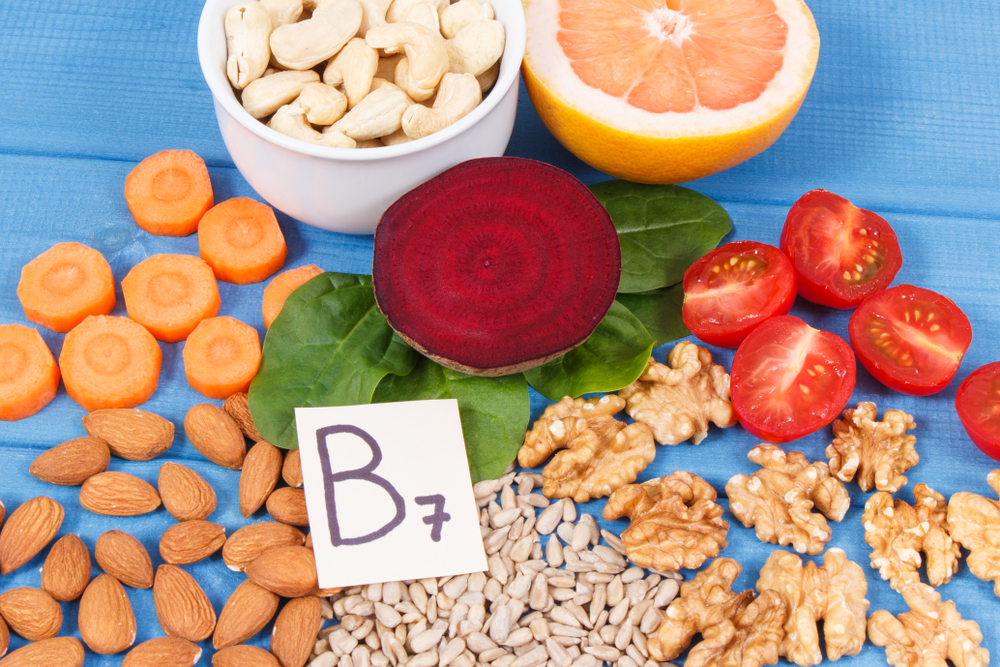Vitamin B7, commonly known as biotin, is a water-soluble vitamin that plays a crucial role in various metabolic processes within the body. It is often referred to as the “beauty vitamin” due to its benefits for hair, skin, and nails. Let’s explore the numerous advantages of biotin, its sources, recommended intake, and potential side effects.
What is Vitamin B7 (Biotin)?
Vitamin B7, or biotin, is a B-complex vitamin that is essential for the metabolism of carbohydrates, fats, and proteins. It is also known as vitamin H. Biotin is water-soluble, meaning the body does not store large amounts of it and requires regular intake through diet or supplements.
Sources of Vitamin B7
Biotin can be obtained from various food sources and is also synthesized by bacteria in the gut. Some of the primary dietary sources include:
- Egg yolks
- Liver
- Nuts and seeds (especially almonds, peanuts, and walnuts)
- Whole grains
- Legumes (such as beans and lentils)
- Meat (especially organ meats like liver)
- Dairy products
- Certain vegetables (like sweet potatoes and spinach)
Benefits of Vitamin B7
1. Promotes Healthy Hair
Biotin is often associated with promoting hair growth and overall hair health. It helps strengthen the hair follicles and improves the keratin infrastructure, which can lead to thicker, fuller hair.
2. Supports Healthy Skin
Biotin plays a role in the maintenance of healthy skin. It contributes to the production of fatty acids essential for skin health and helps to combat dryness, redness, and other skin conditions.
3. Strengthens Nails
Similar to its effects on hair, biotin can strengthen brittle nails and reduce splitting or breakage. It promotes thicker nail growth and improves overall nail health.
4. Boosts Metabolism
As a coenzyme involved in various metabolic reactions, biotin helps convert carbohydrates, fats, and proteins into energy. This can support overall metabolic function and energy production.
5. Supports Cognitive Function
Biotin plays a role in maintaining healthy neurological function. It supports neurotransmitter activity and may help enhance cognitive abilities, although more research is needed in this area.
6. Regulates Blood Sugar Levels
Biotin is involved in the metabolism of glucose and helps regulate blood sugar levels. It can improve insulin sensitivity and reduce the risk of complications related to diabetes.
7. Enhances Pregnancy Health
During pregnancy, biotin is crucial for fetal development. It supports embryonic growth and helps prevent congenital disabilities related to biotin deficiency.
8. Supports Thyroid Function
Biotin plays a role in thyroid hormone synthesis and metabolism. Adequate biotin levels are essential for maintaining optimal thyroid function.
9. Aids in Nutrient Absorption
Biotin is involved in the absorption of other B vitamins and certain minerals, such as chromium. This can enhance overall nutrient utilization and support general health.
10. Promotes Heart Health
Some studies suggest that biotin may play a role in maintaining cardiovascular health by supporting lipid metabolism and reducing inflammation.
Recommended Daily Intake
The recommended daily intake (RDI) of biotin varies by age and life stage:
- Infants (0-12 months): 5-6 mcg/day
- Children (1-3 years): 8-12 mcg/day
- Children (4-8 years): 12-20 mcg/day
- Children (9-13 years): 20-25 mcg/day
- Adolescents and adults (14 years and older): 30 mcg/day
Pregnant and breastfeeding women may require higher amounts of biotin, typically around 30-35 mcg/day.
Potential Side Effects of Biotin
Biotin is generally safe when taken orally in recommended doses. However, excessive intake of biotin supplements can sometimes lead to:
- Skin rashes
- Digestive upset
- Nausea
- Insulin release issues (in high doses)
It’s essential to consult with a healthcare provider before starting any new supplement regimen, especially if you have pre-existing medical conditions or are taking medications.
FAQs About Vitamin B7 (Biotin)
What are the symptoms of biotin deficiency?
Biotin deficiency can cause symptoms such as hair loss or thinning, brittle nails, dry skin, fatigue, and neurological symptoms like depression or lethargy.
Can biotin improve hair growth?
While biotin deficiency can lead to hair loss, supplementation with biotin may help promote hair growth and improve hair health, especially in cases of deficiency.
How long does it take to see results from biotin supplements?
Results from biotin supplementation can vary, but noticeable improvements in hair and nail health may be observed within a few months of regular use.
Are there interactions between biotin and medications?
Biotin supplements can interfere with certain lab tests, such as thyroid function tests and hormone assays. It’s essential to inform healthcare providers if you are taking biotin supplements.
Can biotin help with weight loss?
While biotin is involved in metabolism, there is limited evidence to support its direct role in weight loss. A balanced diet and regular exercise remain key factors for weight management.
Are there natural sources of biotin?
Yes, biotin is naturally found in a variety of foods, including eggs, nuts, seeds, and certain vegetables. Incorporating these foods into your diet can help maintain adequate biotin levels.
Is biotin safe for pregnant women?
Yes, biotin is generally considered safe for pregnant women when taken at recommended doses. It supports fetal development and may help prevent birth defects associated with biotin deficiency.
Can biotin supplements interact with other vitamins?
Biotin supplements are generally safe when taken with other vitamins. In fact, biotin is often included in multivitamin formulations to support overall health.
How does biotin affect skin health?
Biotin contributes to the production of fatty acids necessary for healthy skin. It helps maintain moisture levels and can improve symptoms of dry skin or dermatitis.
Is biotin deficiency common?
Biotin deficiency is rare but can occur in individuals with certain genetic disorders, prolonged use of antibiotics, or those consuming excessive raw egg whites, which contain avidin that binds biotin.
Can biotin supplements help with brittle nails?
Yes, biotin supplements can strengthen brittle nails and improve overall nail health. They promote thicker nail growth and reduce breakage.
- Upper Face Anti Wrinkle Treatment Near Morden, Surrey - June 2, 2025
- Weight Management And Metabolic Health Market Performance UK - June 1, 2025
- Retinol Peel Near East Molesey, Surrey - May 31, 2025

